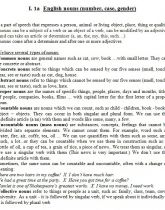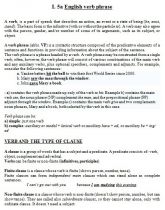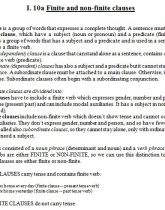Hledej
Zobraz:
Univerzity
Kategorie
Rozšířené vyhledávání
12 662
projektů
Vypracované okruhy z Anglického jazyka
| Přípona .rar |
Typ vypracované otázky |
Stažené 2 x |
| Velikost 0,2 MB |
Jazyk anglický |
ID projektu 8688 |
| Poslední úprava 19.09.2016 |
Zobrazeno 1 670 x |
Autor: katerina.loumova |
 Sdílej na Facebooku
Sdílej na Facebooku |
||
| Detaily projektu | ||
- Cena:
6 Kreditů - kvalita:
82,8% -
Stáhni
- Přidej na srovnání
- Univerzita:Masarykova univerzita
- Fakulta:Filozofická fakulta
- Kategorie:Jazyky » Angličtina
- Předmět:English language
- Studijní obor:-
- Ročník:-
- Formát:Archiv souborů (.rar)
- Rozsah A4:78 stran
I. 1a English nouns (number, case, gender)
= a part of speech that expresses a person, animal or living object, place, thing or quality
- nouns can be a subject of a verb or an object of a verb, can be modified by an adjective
and can take an article or determiner (a, an, the, my, this, such…)
- nouns come after a determiner and after one or more adjectives
We have several types of nouns:
Common nouns are general names such as cat, cow, book …with small letter. They can be concrete or abstract.
Concrete nouns refer to things which can be sensed by our five senses (smell, touch, hear, see or taste) such as cat, dog, house.
Abstract nouns refer to things which cannot be sensed by our five senses (smell, touch, hear, see or taste), such as love, hate.
Proper nouns are the names of specific things, people, places, days and months, titles of people, companies, books, films ... with capital letter for the first letter of a proper noun.
Countable nouns are nouns which we can count, such as child - children, book - books, object - objects. They can occur in both singular and plural form. We can use the indefinite article (a/an) with them and words like some, many, a few.
Uncountable nouns (mass nouns) are substances, concepts, feelings that cannot be divided into separate elements. We cannot count them. For example, word such as water, fire, air, coffe, tea, oil ... We can use quantifiers with them such as some, any, much, a lot...or they can be countable when we use them in construction such as: a bottle of oil, a cup of tea, a grain of rice, a piece of news...We treat them as singular, so we use a singular verb with them (This news is very important.) We don´t use the indefinite article with them.
Sometimes, the same noun can be countable and uncountable, often with a change of meaning:
There are two hairs in my coffee! X I don´t have much hair.
We had a great time at the party. X Have you got time for a coffee?
Hamlet is one of Shakespeare´s greatest works. X I have no money, I need work.
Collective nouns refer to things or people as a unit, such as: family, class, team, crew, university. As a unit - it is followed by singular verb, if we speak about it individually - it is followed by plural verb
= a part of speech that expresses a person, animal or living object, place, thing or quality
- nouns can be a subject of a verb or an object of a verb, can be modified by an adjective
and can take an article or determiner (a, an, the, my, this, such…)
- nouns come after a determiner and after one or more adjectives
We have several types of nouns:
Common nouns are general names such as cat, cow, book …with small letter. They can be concrete or abstract.
Concrete nouns refer to things which can be sensed by our five senses (smell, touch, hear, see or taste) such as cat, dog, house.
Abstract nouns refer to things which cannot be sensed by our five senses (smell, touch, hear, see or taste), such as love, hate.
Proper nouns are the names of specific things, people, places, days and months, titles of people, companies, books, films ... with capital letter for the first letter of a proper noun.
Countable nouns are nouns which we can count, such as child - children, book - books, object - objects. They can occur in both singular and plural form. We can use the indefinite article (a/an) with them and words like some, many, a few.
Uncountable nouns (mass nouns) are substances, concepts, feelings that cannot be divided into separate elements. We cannot count them. For example, word such as water, fire, air, coffe, tea, oil ... We can use quantifiers with them such as some, any, much, a lot...or they can be countable when we use them in construction such as: a bottle of oil, a cup of tea, a grain of rice, a piece of news...We treat them as singular, so we use a singular verb with them (This news is very important.) We don´t use the indefinite article with them.
Sometimes, the same noun can be countable and uncountable, often with a change of meaning:
There are two hairs in my coffee! X I don´t have much hair.
We had a great time at the party. X Have you got time for a coffee?
Hamlet is one of Shakespeare´s greatest works. X I have no money, I need work.
Collective nouns refer to things or people as a unit, such as: family, class, team, crew, university. As a unit - it is followed by singular verb, if we speak about it individually - it is followed by plural verb
Klíčová slova:
english nouns
relative clauses
english verb
false friends
aspects of speech
Obsah:
- 1a. English nouns
1b. Words and meaning
2a. Primary auxiliary and modal verbs
2b. English stress and rhythm
3a. Relative clauses
3b. Description and classification of consonants
4a. Sentence (Clause) elements
4b. Description and classification of English vowels
5a. English verb phrase
5b. Description and classification of English diphtongs and triphthongs
6a. Adverbial clauses
6b. Phrasal and prepositional verbs
7a. Simple sentence and its typology
7b. Origin of English words
8a. Mood of English verb phrase
8b. False friends
9a. Simple and compound sentences
9b. Multi-word lexical units - collocations and idioms
10a. Finite and non-finite clauses
10b. Physiological, acoustic and auditory aspects of speech


